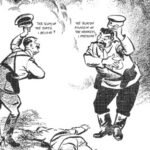As part of the Civil Rights Cases of 1883, in which the Supreme Court stripped African Americans of the hard-fought rights guaranteed to them by the post-Civil War Amendments, Justice Joseph Bradley wrote in a majority opinion that favored (White) business interests over (Negro) human rights:
When a man has emerged from slavery, and by the aid of beneficent legislation has shaken off the inseparable concomitants of that state, there must be some stage in the progress of his elevation when he takes the rank of mere citizen and ceases to be the special favorite of the laws, and when his rights as a citizen, or a man, are to be protected in the ordinary modes by which other men’s rights are protected.
That’s right, it’s the same old canard that would be endlessly repeated from there on out: “Haven’t we done enough for you people? Why don’t you be grateful and move on? Why don’t you take care of yourselves?”
Think about the context here, less than twenty years after the end of the Civil War, after generations upon generations of enslavement and the theft of everything—their ancestral past, their Gods, their languages, their stories, their humanity—with nothing to show for the disintegration of their bodies, their dead loved ones, and their children sold at auction. Yet, after this insurmountable hole they were placed into, it was already acceptable for a Justice of the highest court to lecture them about the need to step down from their special status and, “take the rank of mere citizen.”
And as if all that crap wasn’t enough, where could the formerly enslaved go in 1883 and be treated as a citizen, mere or not? As biographer Peter S. Canellos notes in The Great Dissenter, at the same time that Bradley was pontificating about not cuddling these people with “special favors”:
The Chicago Tribune, a bastion of northern Republicanism, became alarmed enough that it began running a national tally of lynchings in 1882. It recorded forty-eight such murders of Black people across the United States that year and fifty-five more in 1883.
There were just over 50 million people in the US in 1880 and well over 300 million now, so, for comparison’s sake, imagine that 288 to 330 brutal murders took place each year, at the hands of your neighbors and seemingly normal people, with little press coverage—other than to say, “They deserved it”—and no government action, except in the cases where government officers helped commit the murders. That was the reality the formerly enslaved, “Freedmen,” were living with. Those were the “ordinary modes of protection” they faced, as “benevolent” White Society sought to protect those actually deemed worthy of citizenship from the alleged dangers of “race mixing.”
As Black History Month, the shortest month of the year, comes to an end, I’ve been thinking about one of the many lessons from our past that seems to have gone largely unlearned: people in power tend to misjudge things in their favor and to look down upon those who are not in power, assuming there are good reasons for this. In the case of black and white America, this natural tendency has been greatly amplified by pseudoscientific notions that far too many people still believe.
I recently read When Crack Was King by Donovan X. Ramse. One thing that struck me early on in the book was the fact that there were no crack babies. When the crack epidemic was underway, we heard a lot about crack babies whose lives were destroyed before they were even born, but this was based on extremely flimsy evidence, with no major studies to back it up. Don’t get me wrong, crack can certainly affect a baby’s development, as a lot of drugs can, but it’s never done the harm that alcohol has done, nor did it debilitate massive numbers of children for the rest of their lives. There were no crack babies in any sense of the way that media personalities sold it, and alleged experts pushed it. But the crack baby story fed into a larger narrative about out-of-control Blacks, so it was readily accepted. This in turn helped fuel the alleged need for extremely harsh penalties for selling crack versus selling cocaine—even though they are the same drug—because the helpless Blacks had to be protected from the “Super Predator” Blacks. The end result was a further decimation of the Black community while Whites sat back and shook their head. “We gave you MLK Day. We gave you Black History Month. We gave you wellfare. All we do is give and you just can’t get it together. haven’t we done enough for you people?”
If you think these sentiments and this reality are not a legacy of slavery and the entrenchment of White Supremacy, then you haven’t been paying attention. Just as there was never a “Jewish problem” in Europe—only a problem of Christian bigotry—there has never been a Black problem in America. The issue has always been White Supremacy and, no, we haven’t done enough to change this. Most of the time, we don’t even seem to know where to begin.













Leave a Reply